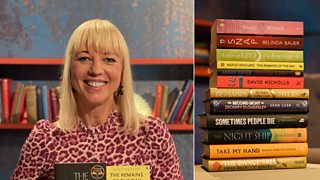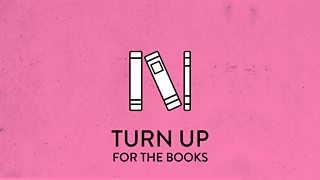Domestic drama to human history: Gripping reads chosen by Ade Adepitan, Gabby Logan, Kerry Godliman and Tom Read Wilson
13 December 2022
On Between the Covers this week, Sara Cox's guests recommend a sweeping global history that targets geography and other factors to explain development, two timely stories of family drama and conflict, and The Moon's a Balloon, David Niven's classic memoir of Hollywood's golden age.

Each week we reveal the favourite books brought in by guests on Between the Covers. This week, Ade Adepitan, Gabby Logan, Kerry Godliman and Tom Read Wilson give Sara Cox their reading recommendations.

Episode five - Favourite books from our guests

Ade Adepitan - Guns, Germs and Steel by Jared Diamond

The cover says: Why has human history unfolded so differently across the globe? And what can it teach us about our current crisis? Jared Diamond puts the case that geography and biogeography, not race, moulded the contrasting fates of Europeans, Asians, Native Americans, sub-Saharan Africans, and aboriginal Australians. An ambitious synthesis of history, biology, ecology and linguistics, Guns, Germs and Steel is a ground-breaking and humane work of popular science that can provide expert insight into our modern world.
The book tells the story of the last 10-15,000 years of human history, and why certain civilizations were able to progress faster than others.Ade Adepitan
Ade says: “The book is basically trying to tell the story of the last ten or fifteen thousand years of human history. It's about who we are, and how we got to where we are today - why certain civilizations were able to progress faster than others - and what were the determining factors?
He talks about Eurasia, which is Europe, Asia and North Africa. He looks at geology, the fact that we were able to grow more crops than in Sub-Saharan Africa and that helped us come together in larger groups, which meant we shared knowledge and then progressed.
And the germs, from all the colds that we got, helped the Spanish go and beat the Incas. They gave them flu - they come over with an army of maybe a few hundred and they destroy a civilization of a million people mainly because of the flu.
I definitely recommend it. It just grips you because it's about us. You know what I mean?”

Gabby Logan - The Echo Chamber by John Boyne

The cover says: The Cleverley family live a gilded life, little realising how precarious their privilege is, just one tweet away from disaster. George, the patriarch, is a stalwart of television interviewing, a 'national treasure' (his words), his wife Beverley, a celebrated novelist (although not as celebrated as she would like), and their children, Nelson, Elizabeth, Achilles, various degrees of catastrophe waiting to happen. The Echo Chamber is a satiric helter-skelter, poised somewhere between farce, absurdity and oblivion. To err is maybe to be human but to really foul things up you only need a phone.
Bizarrely you kind of like all of them, even though they are hideous people.Gabby Logan
Gabby says: “This book is very much in the now, and ‘the echo chamber’ refers to what many people live in through their social media.
We only hear one source, one story, one side of the conversation, and it's this obnoxious family, called the Cleverley family. The father is a newsreader who thinks he might be woke, but is completely racist and politically incorrect. He thinks he's lovely because he met Nelson Mandela once.
And then the wife is an author, but she doesn't write any of her books. She literally will say to the ghost writer, “it's about love, 17th century” and then gets disappointed when they come back with sentences that she doesn't enjoy.
And then the children are awful, and there's a daughter who’s a socialite influencer who has one account where she’s telling everybody everything’s wonderful and then another secret account where she just sends vile abuse to people including her own brothers. One of whom, Achilles, is a young man at school who uses men in honey traps. He basically gets these men to meet him in bars and then gets money out of them or blackmails them, and he’s collected quite a lot of money doing this. Bizarrely you kind of like all of them, even though they are hideous people.
It’s a caper on many levels. And yet there are some very interesting messages about modern life and how people are living in these ‘echo chambers’, and what we're doing to ourselves in terms of isolating and navel-gazing, and being a little bit too insular. And it’s funny. It also has another layer, a kind of interesting social commentary.”

Kerry Godliman - Free Love by Tessa Hadley

The cover says: 1967. While London comes alive with the new youth revolution, the suburban Fischer family seems to belong to an older world of conventional stability: pretty, dutiful homemaker Phyllis is married to Roger, a devoted father with a career in the Foreign Office. But when the twenty-something son of an old friend pays the Fischers a visit one hot summer evening, and kisses Phyllis in the dark garden after dinner, something in her catches fire... Free Love is an irresistible exploration of romantic love, sexual freedom and living out the truest and most meaningful version of our lives.
She's 40 and her age is quite interesting because she's not young, but she's still young enough to grab this life.Kerry Godliman
Kerry says: “I picked a book that I'd read recently, because I've never been someone who has a favourite book, or a favourite song, or a favourite film because these things change, and your tastes change... and my memory is appalling.
Free Love is set in the late 1960s, and it's about a woman called Phyllis who has a kind of happy life. I mean, it transpires it's not so happy, but she has a kind of domestic stability. They've got a nice house and they live in the suburbs, and her and Roger... they've got children.
Then Phyllis has a kind of kiss. It opens with a dinner party at the beginning, and she kisses this young guest, Nicky, who's the son of one of the father's old friends. Phyllis is a bit indifferent to Nicky coming round and she’s a bit like, “but you know I can get dressed up and I can flirt with him and it'll be divine.” And then she has an odd - I wouldn't call it a passionate - snog. It's almost an accident. They sort of fall into each other.
It ignites something in her and she pursues this young man and they have an affair. He lives in Notting Hill so half the story is contrasting these two places: some leaky suburb of London and then Notting Hill Gate. It’s a completely different life for her and she's absolutely enchanted by it. It's bohemian, it's more multicultural, and she's just like “this is freedom, this is…” you know “free love”, and it’s capturing that time, the late '60s. But she's 40, she's not young, but she's still young enough to grab this life, and have a go at that.”

Tom Read Wilson - The Moon’s a Balloon by David Niven

The cover says: Debonair English wit and humorist extraordinaire, star of The Pink Panther, Casino Royal and Around the World in 80 Days, few Hollywood actors are remembered as fondly as David Niven. In this bestselling autobiography, Niven shows how, even as an unknown young man, he knew how to live the good life, regaling us with tales of school expulsion and wartime hi-jinks. However, it is his accounts of working and partying with the legends of the silver screen - from Lawrence Oliver and Vivien Leigh to Elizabeth Taylor, Noel Coward and dozens of others - that turn this memoir into an outright masterpiece.
This kind of delphinium eyed matinée idol... of golden age of Hollywood who then later became this extraordinary raconteurTom Read Wilson
Tom says: “Oh, well. I mean first of all, this man! This kind of delphinium-eyed matinee idol of the golden age of Hollywood, who then later became this extraordinary raconteur about those years. If you've heard him on radio or television talking about that time, you won't be disappointed with this book because it expands on it tenfold.
What's so fascinating is he arrived in Hollywood in the 1930s, and beyond the studios and the homes if the stars, there was nothing. It was a great big desert. So, all the stories are about the stars off-set. His son's first experience of a naked woman was Greta Garbo swimming in his swimming, and there are stories about Loretta Young and about Dietrich, and if he does talk about plays and about screenwriting it’s in a very technical way.
There's a divine bit where he says, “playwright is spelt W R I G H T, like wheelwright, and like shipwright, because plays are built and constructed” - at least the good ones that he’s been part of.
His turn of phrase is delicious. He talks about nerves and excitement all the time. When he's nervous he has watery knees and when he's excited, he has champagne in his knees, and I thought ‘my God, I know that feeling so much more than knees buckling’ you know, it’s that fizzing sensation which I just adore. He’s a wonderful, witty, sparkling storyteller.”

Celebrity confessions: Real life book clubs

Who's been part of a real life book club?
Sara talks book clubs with Ade Adepitan, Gabby Logan, Tom Read Wilson & Kerry Godliman.

More Books from BBC Arts
-

Shelf care: 16 books to banish the winter blues
See more of this winter's recommendations from Between the Covers.
-

The Life Scientific
Jim Al-Khalili talks to Jared Diamond about his journey from the gall bladder to global history via a passion for the birds of Papua New Guinea.
-

Headliners podcast: Kerry Godliman
The comedian and After Life actor on the dangers of using family experiences in an act.
-

Turn Up for the Books
Literature and library chat with Irenosen Okojie, Simon Savidge and Dan Smith






